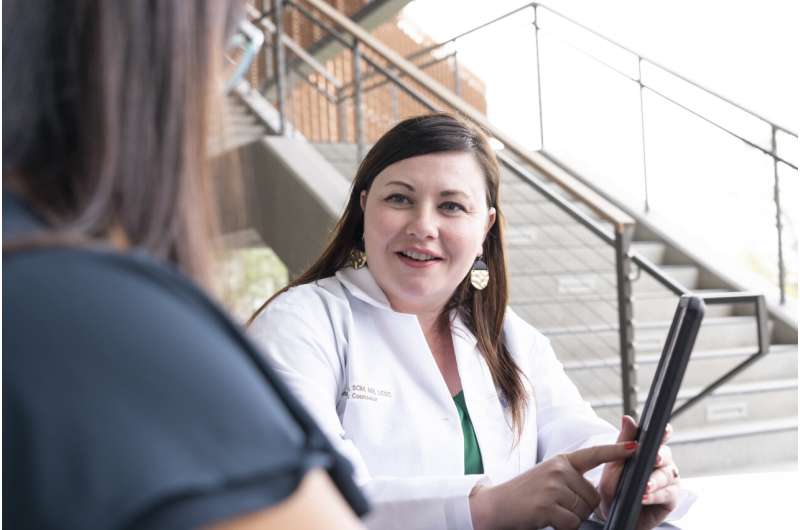This article has been reviewed according to Science X's editorial process and policies. Editors have highlighted the following attributes while ensuring the content's credibility:
fact-checked
peer-reviewed publication
trusted source
proofread
Why it's important to improve communication of unanticipated genomic findings to patients with late-stage cancer

Cancer genomics experts at City of Hope, one of the largest cancer research and treatment organizations in the United States, conducted a qualitative study that underscored the importance of properly preparing patients for unanticipated, inheritable genetic findings prior to receipt of tumor sequencing.
Published in Genetics in Medicine, this data is an important step to improving the delivery of precision medicine to cancer patients.
In surveys, patients expressed emotions ranging from gratitude to regret depending on how much counseling they received prior to tumor testing. Providers said insufficient clinic time was a major barrier to pretest education and favored online support tools and standardized ways to offer pretest education. Some oncologists said they discussed tumor sequencing in the context of patients' treatment but did not always discuss the possibility of secondary findings due to limited clinic time.
"Communications with cancer patients is critical so they can provide informed consent about their treatments. It is important for providers to have conversations with patients they are treating to explain the difference between somatic and germline testing and talk about the possibility that tumor testing may reveal unanticipated, inheritable findings or no actionable findings at all," said Stacy W. Gray, M.D., corresponding author of the study, chief of the Division of Clinical Cancer Genomics and professor in the Department of Medical Oncology & Therapeutics Research at City of Hope.
"Because the patient's condition may affect their treatment preferences, clinicians should reconfirm their interest in receiving secondary findings, document the preference in the electronic medical record and time this disclosure appropriately."
Oncologists typically order tumor sequencing without extensive pretest discussions with patients about the types of results that can be identified, yet secondary genomic findings can impact medical care, lifestyle and reproductive decisions, as well as psychological well-being.
For many patients, secondary findings bring the responsibility of disseminating accurate information to family members—possibly causing psychological distress to loved ones—and navigating strained relationships within their family. These findings indicate a need for increased genetic interventions and clinician guidance to facilitate genetic information sharing within families as medical decisions are made, the study stated.
Additionally, patients with advanced cancer may be overwhelmed by medical information and may be less likely to derive clinical benefit from their inheritable genetic test results if it doesn't come with targeted therapeutic options.
Based on this data, health care systems, labs and genetic providers may eventually need to play a larger role in patient education prior to tumor sequencing. There is a need to develop scalable educational interventions that facilitate informed consent, such as genetic websites, online tools and applications that include videos, visual aids or interactive multimedia.
Somatic or tumor sequencing can identify DNA alterations that inform clinicians if a patient will be responsive to gene-targeted therapy; however, this genetic testing can also deliver information about inheritable or germline variants—unanticipated secondary information about cancer susceptibility.
Researchers interviewed 12 patients and 19 cancer providers in the United States from both City of Hope and other cancer genomics providers, eliciting feedback about patient information needs, emotional responses to secondary findings and recommendations for improving education prior to tumor sequencing.
City of Hope has one of the largest genetic counseling departments in the United States and is reducing the likelihood that patients will be confronted with unexpected secondary findings from tumor testing—decreasing risk by offering all patients "gold standard" germline genetic testing for inherited cancer risk as part of its precision medicine study.
Every single germline test is reviewed by a genetic counselor and flagged as actionable or not actionable so that information can be delivered in an appropriate, patient-sensitive way.
More information: Madeline Currey et al, Preparing for the Unexpected: Recommendations for Returning Secondary Findings in Late-Stage Cancer Care, Genetics in Medicine (2023). DOI: 10.1016/j.gim.2023.100991


















